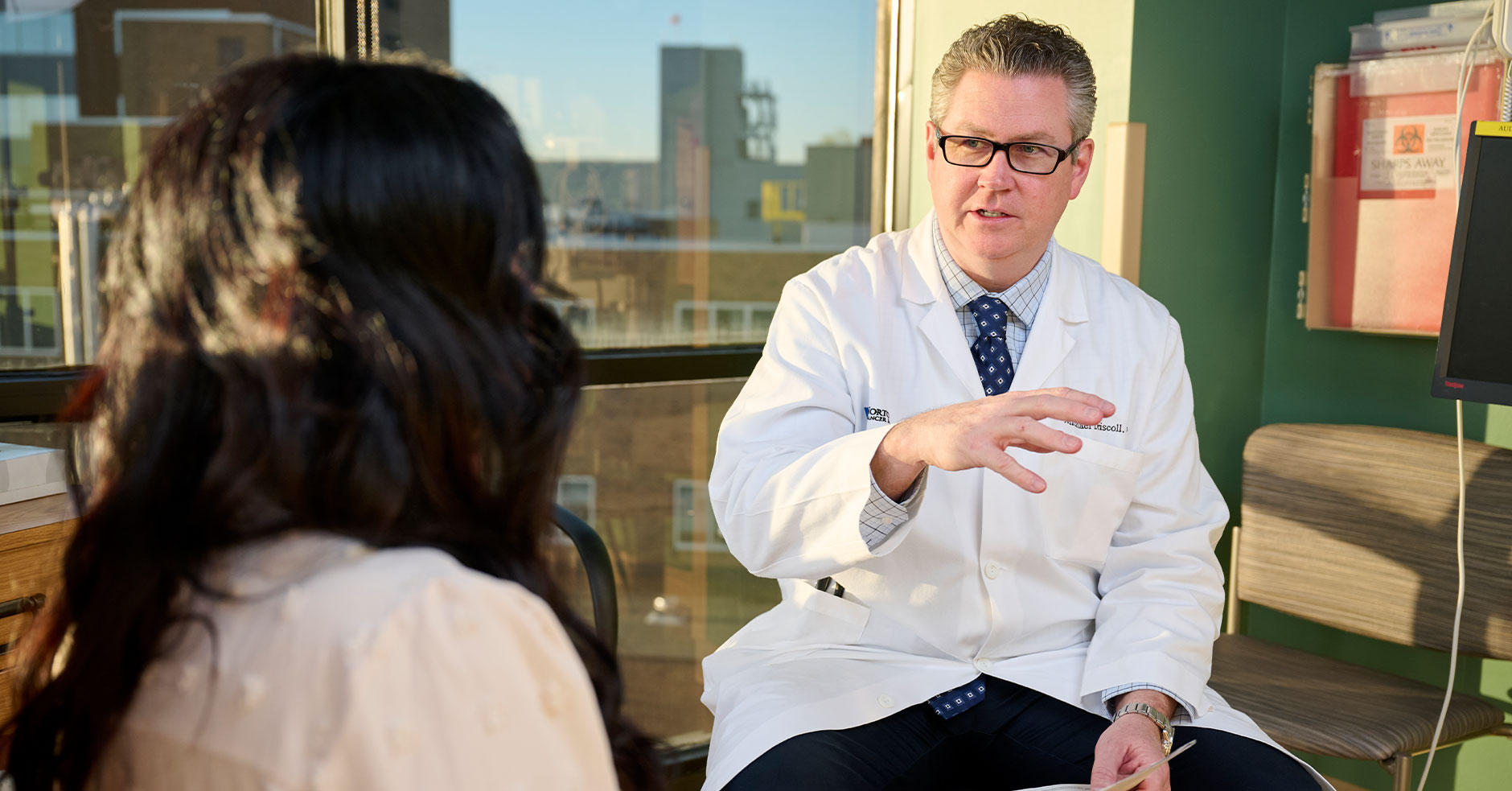Gastrointestinal medical oncologist Michael Driscoll, MD, is passionate about the power of screening

LOUISVILLE Not all screen time is bad — not the type of screen time that gastrointestinal medical oncologists like Michael Driscoll, MD, advocate for. On the contrary, Driscoll, who is the director of the Gastrointestinal Malignancy Program for Norton Cancer Institute, which is part of Norton Healthcare in Louisville, eagerly encourages some potentially life-saving screen time.
“Norton Healthcare really has gone to bat trying to improve colorectal cancer screening rates around the Commonwealth,” says Driscoll, who joined Norton in 2011. “They’ve partnered with the surgeons and the gastroenterologists here to really push for colonoscopy screenings by making availability much better. They’ve gone also to Frankfort trying to improve legislation and to get the payers to have easier access to colonoscopies and colorectal cancer screening. It’s definitely not by happenstance that Kentucky is near the top for colorectal cancer screening.”
Driscoll notes that Norton offers Saturday colonoscopies, enabling more people to be screened without missing work.
“The best screen is the one that you get,” says Driscoll. “If they’re getting them in the right patient population and on time, then it ultimately will decrease people’s risk of dying of this cancer and developing these cancers at later stage or being found at a later stage, which has a worse prognosis.”
The Norton Cancer Institute
Fortunately, the prognosis is not always right. After all, what were the odds that Driscoll would wind up in Louisville? Having grown up in a suburb of Boston and attended Colorado State University majoring in molecular biology, he hadn’t planned on going to medical school. But with an interest in microbiology and working in cancer research after graduation, plans changed. A year later, he was admitted into medical school at LSU.
“I could see the way the world of medicine was going, and everything has gone more molecular and more genetic,” says Driscoll, explaining his ultimate specialty area.
Driscoll’s wife is from Louisville, so he accepted a fellowship at the University of Louisville. The rest is history.
“In the Norton Cancer Institute, we’ve come to the conclusion that oncology is growing at such leaps and bounds that it’s difficult to keep up on everything going on in oncology,” says Driscoll. “We decided that it was in our, and our patients’, best interest to try to subspecialize in different fields within oncology. So I decided to get into GI oncology at Norton.”
A typical day for Driscoll starts with rounding on a few patients in the hospital before going to the clinic, where he sees patients all day long with the assistance of a nurse practitioner and a nurse clinician. He is also typically on call during the week as well as weekend.
“We also see patients that are on active chemotherapy all day long, every day,” says Driscoll. “Depending on what stage they are or what type of cancer they have, we may take their cases to the multidisciplinary conference where we bring up their imaging on the big screen and we talk with surgical oncology or maybe interventional radiology.”
The collaborative efforts don’t end there. A lower GI tumor board and an upper GI tumor board, which meet on separate days, allow for a group discussion to determine the best course of care for each patient.
“We can present all their information, present their cases, look at their imaging, talk with the surgeons, talk with radiology, talk with pathology, medical oncology, interventional, and come up with a game plan right then and there and then go see the patient,” says Driscoll. “Our nurse navigators help set up the plan as we put in orders, getting the patients through the system as quickly as possible. It really has improved the quality of the care of GI malignancy patients significantly.”
Driscoll sees patients ranging in age from their mid-20s to 80s and 90s. Patients who were not diagnosed via screening often present with stool caliber changes, blood in the stool,
constipation, abdominal pain, and bloating. “They may also have weight loss and a constellation of things that is usually from a tumor blocking their gastrointestinal tract,” says Driscoll.
Driscoll notes that in the last 10 years there has been a 20 percent increase in people younger than 50 years old being diagnosed with colorectal cancer. Theories for the causes of the increase include obesity, sedentary lifestyles, processed meats, and other foods. The focus on screening at earlier ages also plays a part.
“We are screening people at younger ages with no personal family history of colorectal cancer and no symptoms. Many of us think that we may even need to be screening younger,” says Driscoll. “Ideally what we want to do is find these patients before they develop cancer. The reason why we have screening tests is to find something before it becomes a big problem. The majority of colorectal cancers will arise from a polyp, and the time to do something about it is when it’s in the polyp stage. So as the saying goes, the best time to treat a cancer is before it starts. If they have a polyp that has a malignant potential, the best thing is to get it removed. That’s why colonoscopy is the gold standard for screening.”
Driscoll says that the fecal immunochemical tests such as Cologuard that are frequently advertised look for blood in the stool.
“When you listen to the commercial, they say it’s 92% effective detecting colon cancer,” says Driscoll. “The flip side of that coin is that it misses 8% of all colorectal cancers. Another statistic they don’t tell you is that it misses 50% of all polyps. But a colonoscopy is both diagnostic and therapeutic. They can remove the polyp before it becomes a cancer.”
Delivering the News. Creating and Working a Plan.
For patients who do have colorectal cancer, Driscoll recognizes the diagnosis can be devastating news. But it doesn’t have to be the end of the world. Helping patients cope with that reality and come to grips with the journey they face is central to his initial meeting with those patients.
“I ask them how much they know, and they usually tell me either nothing or very little,” says Driscoll, who is intentional about communicating with patients in language they can understand. “We formulate a game plan and make sure that everybody knows what it is that they have, what the options are for treatment, including side effects, risk benefits, and then get things executed as quickly as possible.”
Driscoll says that screenings for other gastrointestinal cancers such as pancreatic cancer are not yet where they need to be in terms of effective advanced detection. But ongoing research and trials promise to bring about better methods for screening.
“Oncology screening has significantly improved, especially with colorectal cancers and potentially upper gastrointestinal cancers,” says Driscoll. “I think part of the future of oncology will be MCEDs or multi-cancer early detection assays. There is one called GRAIL, which is probably one of the more prominent ones, and they can actually screen for many, many different cancers with one test. These would be blood tests that they actually can look for certain genes that are modified and they can pick these up in the bloodstream, which could indicate that you could have a cancer trying to develop in you.”
Part of Driscoll’s work to stay ahead of the curve involves being active in clinical trials, which he says is wholeheartedly supported by Norton Healthcare and the Norton Research Institute. “It’s the right thing to do for the patient,” says Driscoll. “We give them options for treatment and potentially access to other medications and new targeted treatments that they wouldn’t otherwise have access to.”
Driscoll, whose aunt died of colon cancer, is passionate about finding better screenings and more effective treatments.
“It’s an exciting time to be in GI oncology, even though we have to give people occasional bad news,” he says. “What keeps us coming back to work is those days when you’re giving people the good news. You go through this cancer journey with not only just the patients, but all their family too. It’s a responsibility that we have.”


